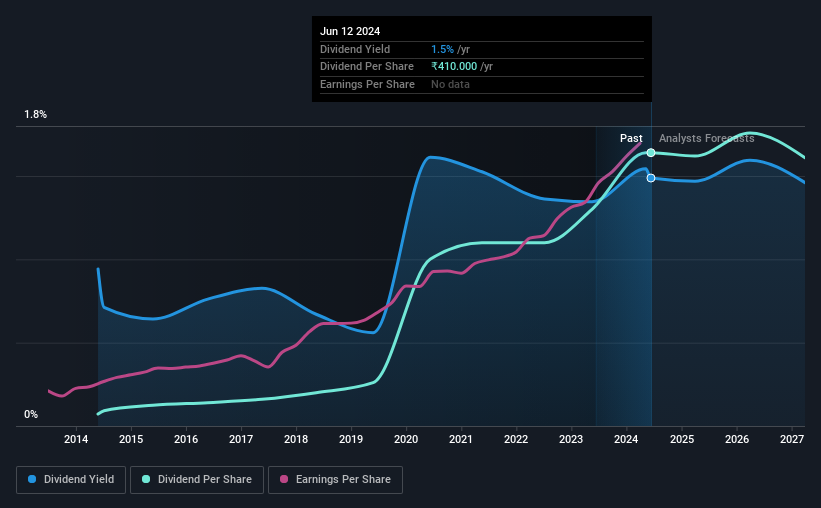Abbott India's (NSE:ABBOTINDIA) Shareholders Will Receive A Bigger Dividend Than Last Year

Abbott India Limited (NSE:ABBOTINDIA) will increase its dividend from last year's comparable payment on the 7th of September to ₹410.00. This will take the dividend yield to an attractive 1.5%, providing a nice boost to shareholder returns.
See our latest analysis for Abbott India
Abbott India's Earnings Easily Cover The Distributions
Impressive dividend yields are good, but this doesn't matter much if the payments can't be sustained. Before this announcement, Abbott India was paying out 73% of earnings, but a comparatively small 75% of free cash flows. This leaves plenty of cash for reinvestment into the business.
The next year is set to see EPS grow by 34.0%. If the dividend continues along recent trends, we estimate the payout ratio will be 68%, which is in the range that makes us comfortable with the sustainability of the dividend.

Abbott India Has A Solid Track Record
Even over a long history of paying dividends, the company's distributions have been remarkably stable. The dividend has gone from an annual total of ₹18.00 in 2014 to the most recent total annual payment of ₹410.00. This works out to be a compound annual growth rate (CAGR) of approximately 37% a year over that time. So, dividends have been growing pretty quickly, and even more impressively, they haven't experienced any notable falls during this period.
The Dividend Looks Likely To Grow
Investors who have held shares in the company for the past few years will be happy with the dividend income they have received. We are encouraged to see that Abbott India has grown earnings per share at 22% per year over the past five years. Earnings per share is growing nicely, but the company is paying out most of its earnings as dividends. This might be sustainable, but we wonder why Abbott India is not retaining those earnings to reinvest in growth.
Abbott India Looks Like A Great Dividend Stock
Overall, we think this could be an attractive income stock, and it is only getting better by paying a higher dividend this year. Distributions are quite easily covered by earnings, which are also being converted to cash flows. All in all, this checks a lot of the boxes we look for when choosing an income stock.
It's important to note that companies having a consistent dividend policy will generate greater investor confidence than those having an erratic one. Meanwhile, despite the importance of dividend payments, they are not the only factors our readers should know when assessing a company. Earnings growth generally bodes well for the future value of company dividend payments. See if the 6 Abbott India analysts we track are forecasting continued growth with our free report on analyst estimates for the company. Looking for more high-yielding dividend ideas? Try our collection of strong dividend payers.
If you're looking to trade Abbott India, open an account with the lowest-cost platform trusted by professionals, Interactive Brokers.
With clients in over 200 countries and territories, and access to 160 markets, IBKR lets you trade stocks, options, futures, forex, bonds and funds from a single integrated account.
Enjoy no hidden fees, no account minimums, and FX conversion rates as low as 0.03%, far better than what most brokers offer.
Sponsored ContentNew: Manage All Your Stock Portfolios in One Place
We've created the ultimate portfolio companion for stock investors, and it's free.
• Connect an unlimited number of Portfolios and see your total in one currency
• Be alerted to new Warning Signs or Risks via email or mobile
• Track the Fair Value of your stocks
Have feedback on this article? Concerned about the content? Get in touch with us directly. Alternatively, email editorial-team (at) simplywallst.com.
This article by Simply Wall St is general in nature. We provide commentary based on historical data and analyst forecasts only using an unbiased methodology and our articles are not intended to be financial advice. It does not constitute a recommendation to buy or sell any stock, and does not take account of your objectives, or your financial situation. We aim to bring you long-term focused analysis driven by fundamental data. Note that our analysis may not factor in the latest price-sensitive company announcements or qualitative material. Simply Wall St has no position in any stocks mentioned.
About NSEI:ABBOTINDIA
Flawless balance sheet established dividend payer.
Similar Companies
Market Insights
Community Narratives




